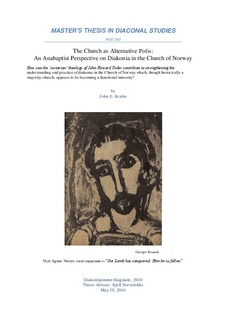The church as alternative polis. An anabaptist perspective on Diakonia in the church of Norway
Master thesis
Permanent lenke
http://hdl.handle.net/11250/98040Utgivelsesdato
2010-08-23Metadata
Vis full innførselSamlinger
Sammendrag
Research question: How can the ‗sectarian‘ theology of John Howard Yoder contribute to strengthening the understanding and practice of diakonia in the Church of Norway which, though historically a majority-church, appears to be becoming a functional minority?
In the CoN‘s Plan for Diakonia (PFD) diakonia is defined as the ‗gospel in action‘. This is a paradigm shift which moves diakonia from the ‗worldly regiment‘ to the ‗spiritual regiment‘; within the doctrine of Justification by Faith it moves diakonia from law to gospel. Using a Liberation Theology-based praxis-action-praxis methodology, this study argues that these doctrines do not adequately support the paradigm shift. The hermeneutical ‗location‘ out of which these doctrines developed was a variation of the Constantinian synthesis of church and state. When theological reflection takes place from a position of power in society it tends to legitimate the goals of the state and reinforce a conservative social praxis. The new PFD calls the church to a more radical social ethic. This study presents the theology of J.H.Yoder, an Anabaptist whose social ethic, though rejected by Lutheran theology, supports the PFD paradigm shift. Yoder argues that: 1) the social ethics of Jesus are found throughout the NT, 2) justification, sin, the cross, and the sacraments are all rooted in the radical ethics lived and taught by Jesus and the community he established, 3) the ‗principalities and powers‘ is NT language describing power and helps to explain the autonomy of politics, 4) the message of Jesus was political. The cross is Jesus‘ way of ‗ruling‘ and overcoming evil; servanthood replaces dominion, forgiveness absorbs hostility. This study argues that the CoN is becoming a minority church. Yoder‘s theology can strengthen congregational diakonia and provoke the re-formulations of Lutheran doctrine the CoN needs to meet the challenges of its new minority status.
